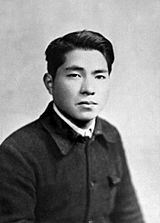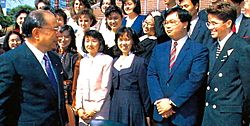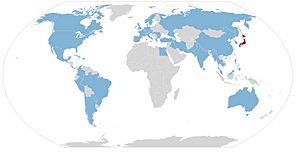Daisaku Ikeda facts for kids
Quick facts for kids
Daisaku Ikeda
|
|
|---|---|
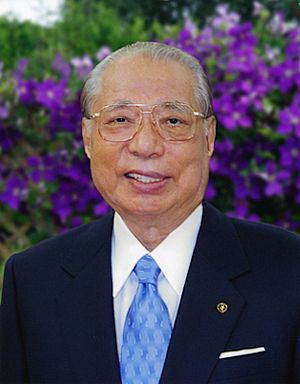
Ikeda in 2010
|
|
| President of Soka Gakkai International (SGI) | |
| In office 26 January 1975 – 15 November 2023 |
|
| Honorary President of Soka Gakkai | |
| In office 24 April 1979 – 15 November 2023 |
|
| 3rd President of Soka Gakkai | |
| In office 3 May 1960 – 24 April 1979 |
|
| Preceded by | Jōsei Toda Tsunesaburō Makiguchi |
| Succeeded by | Hiroshi Hōjō (北条浩) Einosuke Akiya Minoru Harada |
| Personal details | |
| Born | 2 January 1928 Ōta, Tokyo, Japan |
| Died | 15 November 2023 (aged 95) Shinjuku, Tokyo, Japan |
| Spouse | Kaneko Ikeda (池田香峯子) |
| Children | 3 (1 deceased) |
| Parents |
|
| Residences | Japan, Tokyo, Shinjuku-Ku, Shinanomachi (信濃町) |
| Alma mater | Fuji Junior College (present-day Tokyo Fuji University) |
| Signature | |
Daisaku Ikeda (born 2 January 1928 – died 15 November 2023) was a Japanese Buddhist thinker, teacher, writer, and a strong supporter of nuclear disarmament. He was the third president and later the honorary president of the Soka Gakkai. This is one of Japan's largest new religious movements.
Ikeda also founded the Soka Gakkai International (SGI). This is the world's largest Buddhist organization for everyday people. It has about 12 million members in 192 countries.
Ikeda was born in Tokyo in 1928. His family were seaweed farmers. He lived through World War II as a teenager. This experience deeply affected him. It made him want to find ways to stop human conflict.
At 19, Ikeda started practicing Nichiren Buddhism. He joined a youth group of the Soka Gakkai. This led to his life's work. He helped create the global peace movement of Soka Gakkai International. He also started many places focused on peace, culture, and education.
In the 1960s, Ikeda worked to improve relations between China and Japan. He also started the Soka education network. This network includes schools from kindergarten to university. He began writing his long historical novel, The Human Revolution. This book is about the Soka Gakkai's growth under his mentor Josei Toda.
In 1975, he became the first president of the Soka Gakkai International. Throughout the 1970s, he started many citizen diplomacy efforts. These included international exchanges for peace, culture, and education. Since the 1980s, he often called for nuclear disarmament in his yearly peace proposals.
Ikeda's vision for the SGI was described as a "borderless Buddhist humanism." This idea emphasizes free thinking and personal growth. It is based on respecting all life.
Contents
Early Life and Background
Daisaku Ikeda was born in Ōta, Tokyo, Japan. This was on January 2, 1928. He had four older brothers, two younger brothers, and a younger sister. His parents later adopted two more children. This made a total of 10 children in the family.
Since the mid-1800s, the Ikeda family had successfully farmed nori, which is edible seaweed. Their business was the largest nori producer in Tokyo by the early 1900s. However, the 1923 Great Kantō earthquake destroyed their family business. By the time Ikeda was born, his family was struggling financially.
In 1937, the Second Sino-Japanese War started. Ikeda's oldest brother, Kiichi, was drafted into the military. Within a few years, his three other older brothers were also drafted. In 1942, while his brothers were overseas, Ikeda's father, Nenokichi, became very sick. He was bedridden for two years. To help his family, Ikeda started working at a steel factory at age 14. This was part of Japan's wartime youth labor group.
In May 1945, Ikeda's home was destroyed by fire during an Allied air raid. His family had to move to the Ōmori area of Tokyo. In May 1947, the Japanese government told the Ikeda family that his eldest brother, Kiichi, had been killed in action in Burma (now Myanmar). They had not heard from him for years.
After the war, in August 1947, Ikeda was 19 years old. A friend invited him to a Buddhist meeting. There, he met Josei Toda, the second president of the Soka Gakkai Buddhist organization. Ikeda began practicing Nichiren Buddhism and joined the Soka Gakkai. He saw Toda as his spiritual teacher. He said Toda influenced him with "profound compassion."
Career and Leadership
After World War II, in January 1946, Ikeda got a job at Shobundo Printing Company in Tokyo. In March 1948, he finished Toyo Trade School. The next month, he started night school at Taisei Gakuin (now Tokyo Fuji University). He studied political science. During this time, he edited a children's magazine called Shonen Nihon. This magazine was published by one of Josei Toda's companies. From 1948 to 1953, Ikeda worked for different companies owned by Toda.
Youth Leadership and Growth
In 1953, at 25, Ikeda became one of the Soka Gakkai's youth leaders. The next year, he became the director of the Soka Gakkai's public relations. Later, he became its chief of staff.
In April 1957, some young Soka Gakkai members were arrested in Osaka. They were accused of giving out money and gifts to support a political candidate. Ikeda was arrested and held for two weeks. He was accused of being in charge of these activities. This happened as Soka Gakkai candidates were winning elections. Some conservative groups started attacking the Soka Gakkai in the media. This led to Ikeda's arrest. After a long court case, Ikeda was found innocent in 1962. The Soka Gakkai saw this as a victory.
Leading the Soka Gakkai
In May 1960, two years after Toda's death, Ikeda became the third president of the Soka Gakkai. He was 32 years old. Later that year, Ikeda started traveling overseas. He wanted to connect Soka Gakkai members around the world. He also wanted to expand the movement globally. He said this was "Toda's will for the future."
Under Ikeda's leadership, the Soka Gakkai grew internationally. It became the largest and most diverse lay Buddhist group in the world. He worked to improve the group's public image. He also changed some of its practices.
In 1979, Ikeda stepped down as president of the Soka Gakkai in Japan. He became honorary president. Hiroshi Hōjō took over as president. Ikeda is still seen as the Soka Gakkai's spiritual leader.
Founding Soka Gakkai International
By the 1970s, Ikeda's leadership had made the Soka Gakkai an international Buddhist movement. It became very active in peace, cultural, and educational work. On January 26, 1975, a world peace conference was held in Guam. Soka Gakkai members from 51 countries created a new organization. This was the Soka Gakkai International (SGI).
Ikeda became the founding president of the SGI. In his speech, he told the members to work for others. He said, "Please devote yourselves to planting seeds of peace throughout the world."
Ikeda's Legacy
Ikeda's leadership helped the Soka Gakkai become a global movement. He encouraged SGI members to be socially responsible. He also fostered a strong spirit of global citizenship. His ideas on "Buddhist-based humanism" focus on dialogue and mutual respect.
His work is part of a larger effort to bring together Eastern and Western ideas. This search is for shared human values. Many universities and research centers study Ikeda's philosophy. His ideas on education aim to create a "world view of dialogic resistance." This means responding to problems with open discussion.
Philosophy and Beliefs
Ikeda's relationship with his mentor, Jōsei Toda, was very important. He was also influenced by Tsunesaburō Makiguchi's ideas on education. These influences shaped his belief that dialogue and education are key to building trust and peace. He believed that Buddhism helps people find a spiritual path. This path connects faith and human dignity to make positive changes in society.
He saw the Middle Way as a balance between idealism and materialism. This means focusing on public interest, practical policies, and ethics. The goal is for people to find happiness. He emphasized that individual efforts can lead to peace and happiness for everyone. This idea is central to his book The New Human Revolution. It highlights the value of all life.
In a 2008 interview, Ikeda said that Mahayana Buddhism aims for happiness for oneself and others. He said the Lotus Sutra teaches that everyone has Buddha-nature. This means all people can achieve enlightenment, no matter their background. He believed that even small changes in one person can transform society.
Accomplishments
Ikeda believed in "Buddhist principles" that are "rooted in our shared humanity." He thought that faith and human dignity could lead to positive change. His goal was to promote mutual respect and dialogue.
Building Institutions
Ikeda founded many institutions. These promote education, cultural exchange, and peacebuilding through dialogue. Some of these include:
- Soka University in Japan and Soka University of America in California.
- Soka schools for kindergarten, primary, and secondary levels in several countries.
- The Victor Hugo House of Literature in France.
- The International Committee of Artists for Peace in the United States.
- The Min-On Concert Association and Tokyo Fuji Art Museum in Japan.
- The Toda Peace Institute and the Ikeda Center for Peace, Learning, and Dialogue in the United States.
From 1990, Ikeda worked with Rabbi Abraham Cooper and the Simon Wiesenthal Center. They worked to fight anti-Semitic ideas in Japan. They created a Holocaust exhibition called The Courage to Remember. Over two million people in Japan saw this exhibit.
Ikeda also supported the Earth Charter Initiative. This project promotes a global ethic for a sustainable world. The SGI has supported the Earth Charter with exhibitions like Seeds of Change and Seeds of Hope.
Peace Proposals
Since 1983, Ikeda sent yearly peace proposals to the United Nations. These proposals discussed many topics. They included building a culture of peace, gender equality in education, and empowering women. He also wrote about youth empowerment and activism for peace. He called for UN reform and universal human rights.
He often argued that people achieve their best when they work together. His proposals for nuclear disarmament built on his mentor Josei Toda's ideas. Toda had called nuclear weapons "an absolute evil." Ikeda also called for a shift away from nuclear energy. In his 2015 proposal, he asked for global action to protect human rights. This included helping refugees and getting rid of nuclear weapons.
Citizen Diplomacy
Academics describe Ikeda's work as citizen diplomacy. This is because he helped build ties between Japan and other countries. He also helped connect people worldwide. Ikeda's talks with scholars, politicians, and cultural figures raised awareness for peace. They also helped create deeper international relationships.
Ikeda met with many important people. These included Austrian-Japanese politician Richard von Coudenhove-Kalergi. He also had important talks with historian Arnold J. Toynbee. These talks were published as the book Choose Life. In 1974, Ikeda met with French novelist Andre Malraux.
In September 1974, Ikeda visited the Soviet Union. He met with Premier Alexei Kosygin. Kosygin agreed with Ikeda that war is meaningless. He said, "If we stop preparing for war and prepare instead for peace, we can produce food instead of armaments." Ikeda told him his basic belief was in "peace, culture and education – the underlying basis of which is humanism."
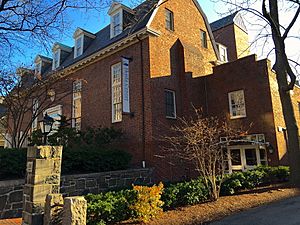
In January 1975, Ikeda met with Henry Kissinger, the U.S. Secretary of State. He urged them to reduce nuclear tensions. The same month, Ikeda met with UN Secretary-General Kurt Waldheim. Ikeda gave Waldheim a petition with 10 million signatures. This petition called for getting rid of all nuclear weapons.
Ikeda's meetings with Nelson Mandela in the 1990s led to anti-apartheid lectures and exhibits. They also started student exchange programs. In 1991, he turned a French castle into the Victor Hugo Literary House. This was for meetings and discussions about literature and arts.
Ikeda also had dialogues with former Indonesian President Abdurrahman Wahid. They talked about how tolerance, peace, and human rights should be central to religions. His discussions with Mikhail Gorbachev were published as Moral Lessons of the Twentieth Century.
Sino-Japanese Relations
Ikeda visited China several times. He met with Chinese Premier Zhou Enlai in 1974. These visits helped establish cultural exchanges between China and Japan. They also opened academic exchanges between Chinese schools and Soka University. Chinese media say Ikeda was an early supporter of improving relations between China and Japan.
Since 1975, cultural exchanges have continued. These are between the Min-On Concert Association, founded by Ikeda, and Chinese groups. After Ikeda's 1984 visit to China, his efforts helped strengthen relations between the two countries.
Awards and Honors
Ikeda received many awards and honors for his work.
International Awards
In 2018, Ikeda received a FIRMA award for his commitment to interreligious dialogue. Other international awards include:
- Australia: Gold Medal for Human Rights from the Sydney Peace Foundation (2009)
- Australia: Gandhi International Prize for Social Responsibility (2014)
- Brazil: Medalha D. André Arcoverde (2017)
- China: International Literary Award for Understanding and Friendship (2003)
- India: Tagore Peace Award (1997)
- India: Jamnalal Bajaj Award (2005)
- India: Indology Award (2011)
- Macedonia: World Prize for Humanism (2007)
- Philippines: Rizal International Peace Award (1998)
- Philippines: Golden Heart Award from the Knights of Rizal (2012)
- Philippines: Gusi Peace Prize
- Russia: Order of Friendship (2008)
- Singapore: Wee Kim Wee Gold Award (2017)
- United Nations: United Nations Peace Medal (1983)
- United States: Rosa Parks Humanitarian Award (1993)
- United States: International Tolerance Award from the Simon Wiesenthal Center (1993)
- United States: Education as Transformation Award (2001)
International Honors
In 1999, the Martin Luther King Jr. Chapel in Atlanta, Georgia, started the Gandhi, King, Ikeda Institute. This institute promotes peace and nonviolence. In 2001, they launched an exhibit called Gandhi, King, Ikeda: A Legacy of Building Peace. This exhibit shows how these three leaders worked for peace. They also created the Gandhi, King, Ikeda Community Builders Prize.
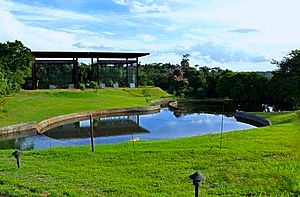
In 2000, the city of Londrina, Brazil, named a 300-acre nature reserve after Ikeda. The Dr. Daisaku Ikeda Ecological Park is open to the public. Its land and wildlife are protected by law. In 2014, the City of Chicago named a street "Daisaku Ikeda Way."
The United States House of Representatives and several states have honored Ikeda. They praised his dedication to peace and human rights through education and cultural exchange. The Club of Rome named Ikeda an honorary member. He has also received over 760 honorary citizenships from cities worldwide.
In 2016, Daisaku Ikeda was named an International Poet of Peace. This was part of an initiative by the Mohammed bin Rashid World Peace Award.
Academic Honors
In November 2010, the University of Massachusetts Boston gave Ikeda an honorary doctorate. This was his 300th such award from universities in over 50 countries. He accepted it on behalf of SGI members. He received his first honorary doctorate in 1975 from Moscow State University. As of August 2020, he had received about 395 academic honors.
Personal Life
Ikeda lived in Tokyo with his wife, Kaneko Ikeda. They married on May 3, 1952. They had three sons: Hiromasa, Shirohisa (who died in 1984), and Takahiro.
Daisaku Ikeda passed away on November 15, 2023, at the age of 95. His death was announced publicly on November 18.
Books and Writings
Ikeda was a very active writer and peace activist. He also explained Nichiren Buddhism through his writings. His books often discuss the value of religion, the importance of life, and social responsibility.
His book Choose Life: A Dialogue (1976) is a record of his talks with British historian Arnold J. Toynbee. They discussed many topics, from human life to the future of civilization. This book has been translated into many languages.
In Before It Is Too Late (1984), Ikeda and Aurelio Peccei discussed environmental issues. They called for a new way of thinking about how humans interact with nature. They believed environmental education was very important.
Ikeda's children's stories are well-known. The Hindu newspaper reported that an anime series of 14 of his stories was shown on National Geographic Channel. These stories often show themes of hope and perseverance. They teach children about friendship, peace, and courage.
Since 2003, The Japan Times newspaper published Ikeda's articles. These articles were about global issues like peacebuilding and nuclear disarmament.
His book The Inner Philosopher (2012), written with Lou Marinoff, shows how philosophy can help in daily life. It suggests that philosophy can bring optimism.
The Human Revolution
Ikeda's most famous book is the novel The Human Revolution (Ningen Kakumei). It was first published in the Soka Gakkai's newspaper. The English version has a foreword by British philosopher Arnold J. Toynbee. It has been translated into many languages.
In the book's preface, Ikeda describes it as a "novelized biography of my mentor, Josei Toda." His official website says the book tells the story of the Soka Gakkai's growth in Japan. It covers the time from after World War II to the last years of its second president, Josei Toda.
This book is often seen as a story about his own life. It shows Ikeda as a great student of his mentor, Toda Josei. It presents the mentor-student relationship as something that can greatly help the student. It suggests that Soka Gakkai members can also achieve great things by following their mentor. This encourages them to work for goals like expanding the Soka Gakkai and promoting peace, culture, and education.
See also
 In Spanish: Daisaku Ikeda para niños
In Spanish: Daisaku Ikeda para niños
- List of peace activists
Images for kids


